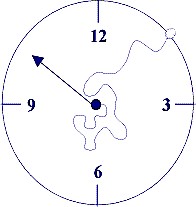Eritrea: BROKEN BRIDGES – Chapter 4

CHAPTER 4 - WHEN TIME RAN OUT
It was late in the evening again. Bashai had a table all by himself. A group of young men, not far from where he sat, were drinking all sorts of spirits – trying their very best to intoxicate themselves to oblivion.
He sat there gazing. His eyes remained fixed on something while focusing on nothing. It looked as if he was trying to figure out the beginning and end of everything.
“What I cannot understand is why…“ was one of his classic mantras.
Moments later, Bashai Junior entered and merged into the scenery of oblivion.
Bashai blinked twice, smiled and said, ንበር [have a seat or, literally, live] to his genetic mirror.
B. Junior took a seat alright but, as traditional custom requires, didn't say ብሰማይ ክበሩ [may you have respect in the heavens].
Bashai didn't mind that oblivion either and asked, እንታይ ኣሎ ኣኸባር? [What's up?]
B. Junior said that he had been reading a short story about world history and that it was an interesting read.
Bashai, probably fed up with stories at that moment, said, Sempre i libri! [always books!]
ናይ ዓድኻ ዘይፈለጥካስ ናይ ዓለም! [You know nothing about your country/village and you want to know about the world!]
What was the story about anyway? He asked - hiding his feeling of curiosity.
B. Junior started relating, in triple languages, a story that he had read a couple of days before.
In the beginning there was nothing. Void it was. Absolutely nothing. Total silence. Deep sleep. No life and no death.
A spark and then a boom!
A power-burst just happened in zero time and it marked the birth of time.
Whatever happened later, or much later, is storytelling - just an attempt to make sense of something out of nothing or just pastime stuff.
Sometime later, people convinced each other - by consensus or otherwise - to cool themselves down. This is natural, they argued. Things happen, they agreed.
But there was a problem - a problem that demanded some form of representation. How could we possibly represent all that in our kind of language? They asked themselves.
They gathered and talked late into the night. And after much thought and sharing of minds and exchange of words, they agreed to sleep on it.
They got hold of a twig sometime late in the morning.
They scratched a figure that looked like the number one on the ground and declared, "this is something." And they scratched another figure that looked like a circle and declared, "this is nothing."
To this day, the two figures are known as something/nothing, one/zero, on/off, the number 10 and so forth.
They worshipped 10 things of this and that and it went on forever until something else happened.
A new breed of humans evolved and said, "Enough of this witchcraft!"
"The power-burst," the new breed declared, "happened at exactly 10 in the morning - not earlier and not later - and you better believe it. It is the truth!" The 'or else' was inbuilt into that declaration.
Time went by and things, as usual, happened for and in spite of the new truth. Many died until something else happened all over again.
Another breed of people evolved and said, "Enough of this nonsense!"
"We have to have a clock!" they declared.
"The power-burst," they declared in their turn, "can only be managed and measured by time, on time and in due course of time."
They designed a circular thing and called it 'the clock.' They said, "this is nothing!" and after fixing a handle at the centre of the 'nothing', they said, "this is something!" It all clicked and clocked.
Everything was organised around the click-clock and a new and strange feeling developed.
"We are under stress here!" the people complained. "We can't handle the ticking seconds!" they protested. "We are becoming second-hands here!" they shouted in desperation.
That was it. Hell broke loose.
"The second generation needs a hand!" became the new motto.
The next generation arrived and declared, "What is the point? Why all the stress and the mess?"
"Easy busy does it!" became the motto of the new generation.
It was another stage of power-burst in zero time and all over again.
That was the end of B. Junior's reported storyline.
What has all that got to do with our kind of history? Bashai asked with eyes wide open.
B. Junior, at a loss himself as well, said, it all started in ሕምብርቲ [Hm'br’ti!]
ሕምብርቲ? Bashai echoed back and asked with a blank face, what has ሕምብርቲ got to do with all that? እዚ ሕምብርቲ ናይ ዓድና ወይስ ናይ ነብስና? [the Hm'berti of our country/village or that of our body?]
Bashai felt a sensation of an out-of-body experience.
ክልቲኡ [both] B. Junior replied, slightly aware that he might be standing on a this-land-of-mine thing somewhere around there.
Bashai couldn't make heads or tails of it all.
ሕምብርቲ [Hm'berti] had a triple meaning. It stood for a name of a village in Eritrea, the bellybutton and it also meant 'the centre.'
Most of the time, Bashai had the ability to change or shift subjects to suit his needs. He was at a loss to move the subject of ሕምብርቲ from where it stood. It is not in his nature to ask questions. He is the type of guy who makes blunt statements and sticks to them at whatever the cost.
This time however, he had to ask.
What do you mean by ክልቲኡ? [both?] Bashai wanted to know with a blank face.
B. Junior realised that the time has come to walk the talk.
It all started in ሕምብርቲ:: B. Junior began.
From there, B. Junior went on, it (whatever he meant by 'it') went to Asmara, Keren, Khartoum, Cairo, Moscow, Rome, London and then New York.
Bashai opened his mouth but no words came out it.
B. Junior continued. From there, he said, it has to go all the way back to ሕምብርቲ where it all began - to the centre of it all. Or else, B. Junior threatened, all will be lost.
Bashai was at the end of his wits. He couldn't utter a word for sometime. He came back to his senses and said, ዝወደይ [my son] we have come a long way but ሕምብርቲ is still far away.
B. Junior jumped to the opportunity offered by the other meaning of ሕምብርቲ and pushed another button. እዚ ሕምብርቲ ናይ ዓድና ወይስ ናይ ነብስና? [the centre of our village or our bellybutton?]
He had a point there. Distance-wise, the latter meaning was much closer than the former. It was right there.
We can touch it, he said.
Bashai had no buttons left to push and his centre was under threat. ንሱ ኻልእ ዘረባ እዩ
[that is another subject], he said with a depressing tone. He was unable to change the subject.
It's all about ሕምብርቲ anyway. B. Junior insisted.
New Yorkን ሕምብርትን እንታይ ኣራኸቦም? [What do New York and ሕምብርቲ have in common here?]
Bashai fought back. It was the only question he could come up with and, without knowing it, he hit upon the idea of the global village.
And, in turn, that shut B. Junior's mouth for sometime. Both had to stay calm, collect themselves and absorb all that to make the next move.
B. Junior was in a state of mind where he was making things up as he went along. He took sometime to respond back. He could have said I don't know. He didn't.
We've all become prisoners of time, B. Junior said with a sad voice and added, while time flies past like the birds in the sky.
Time? Siamo sempre prigionieri del tempo. Certo! [Sure! we are always prisoners of time]
Bashai agreed and went on, it clicks and clocks and we are all stuck in it. ሓድሽ ነገር ኣይኰነን
[There is nothing new there.]
For Bashai, it was like that forever and he did not like the idea of changing all that.
You could be right Bashai but this time, it is more like a time-bomb - B. Junior replied back.

You mean it can explode anytime? Bashai asked with a voice barely audible.
Absolutely. B. Junior confirmed.
Porca la miseria! እዚኣስ የለኹላን [I am out of here!] ደሓን ሕደር [good night]
With that, Bashai woke up from his oblivion, walked slowly towards the door, looked back, gave the place a swift scan, opened the door and joined the crowd outside.
Unfortunately, B. Junior couldn't walk away from the scene. He sat there unable to move a muscle. He tried and he couldn't. It was as if he was stuck to the chair while the clock was ticking.
There was no fear left and the need to feel the living mattered more than everything. The time-bomb exploded and nothing happened. It was a mute event of another burst of power and birth of time. And, if there was anything that happened, it was not the change of scenery in front of the eyes.
It was the change of perception that lied behind them.
A few days later however and after all that turmoil through that passage of time in the scenery of oblivion, B. Junior couldn't recall ሕምብርቲ at all.


![[AIM] Asmarino Independent Media](/images/logo/ailogo.png)
